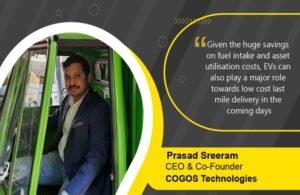 EV revolution in the country
EV revolution in the country
With the current situation of global climate change and unreliable fuel market, everyone is moving towards an electric-based mobility solution, one that entails a nation to overhaul major infrastructures, establish high financial funded analysis, amend government laws, and adapt offered resources to rework its gasoline-based facility to an electrical one. Sustainability is becoming a top mandate for industrialists across the world, with more than 80% of the 1,100 industry leaders surveyed saying sustainability is now an important issue, according to a report by MIT Centre for Transportation & Logistics.
The massive growth and adoption in the EV(Electric Vehicle) segment have not only made them the future of mobility but also the future of the 100 smart Indian cities already in the works. And, that includes electrifying India’s $160 billion logistics sector. India is rapidly building infrastructure to promote EVs as the new means of transport in line with India’s pledge to reduce 40% of its fossil fuel consumption by 2030. One EV reduces upto 6 tonnes of CO2 emission per year. India’s EV market is expected to grow at a compounded annual growth rate (CAGR) of 90 per cent in this decade to touch $150 billion by 2030, according to a report by RBSA Advisors. India’s shift to shared, electric and connected mobility could help the country save nearly one giga-tonne of carbon dioxide emissions by 2030.
Efficiency of EV in Last-mile logistics
In the case of last mile logistics, and doorstep deliveries EVs have played a key role during the pandemic. For consumers, EVs enable them to optimise their deliveries, and allow them to operate for more trips, lesser maintenance, and service support. Further, given the continuous surge in consumer fuel prices, EVs can easily help reduce vehicle running costs as compared to ICE vehicles. To understand this better, an average EV based two-wheeler can be fully charged for approximately 14 paisa and travel between 60- 70 kms. On the other hand, a petrol-based motorbike needs more than a litre of petrol to travel the same distance. Thus, the economic benefits of EVs in the long run are compensated by their initial high acquisition. Top this with reduced carbon footprint and EVs become an attractive proposition.
EVs are far less complex vehicle structures and can easily help customers reduce hidden costs by modern technologies and software for fleet tracking, battery health and optimization and telematics as they are easier to integrate with sensors. Given the huge savings on fuel intake and asset utilisation costs, EVs can also play a major role towards low cost last mile delivery in the coming days. This will lead to easing of retail prices of several items as logistics is a key component in the cost mix. The shift is already happening.
Does Monsoon affect the efficiency of EV?
With the monsoon season approaching us, the question everyone is trying to find the answer to is – Will the monsoon affect your EV?
Electric cars pose no threat of electric shock and are not dangerous to drive in the rain. Likewise, EVs are safe to drive through water, the batteries and accompanying electric systems in EVs are isolated and equipped with extensive safety systems that automatically shut off power and insulate the battery packs when a collision or short circuit is detected. It is pretty much impossible, under normal working conditions, for water to come into direct contact with the batteries themselves. Most modern electric vehicles have resorted to putting the battery and other electrical components in the bottom section, one that is most likely to be exposed to flooding. However, the components are well-sealed, insulated, and are watertight, to ensure there’s no seepage of water.
Hence, Monsoon will never impact the efficacy of your EV, unless taken good care of.
How to take care of EV in monsoon?
Your EV will easily survive the monsoon season with you taking care of things like:
- Charging the car in a dry and covered place.
- Charge your car in a shed or a garage, away from the rain.
- Ensure that the charger is dry and clean.
- Avoid charging during extreme weather conditions such as heavy thunderstorms or lightning.
- Always use an OEM-certified or the original charger that came with your EV. These come with in-built protective layers to work efficiently during such weather conditions.
Adoption of EV in Last-mile logistics will never be impacted by monsoon. EV is built for all seasons, people using EVs must be well aware about the myths and facts around it. It’s important that we as a country take initiatives to promote EV adoption throughout the nation by educating people about the benefits of an Electric Vehicle.
